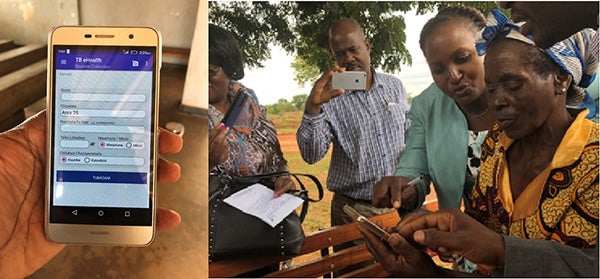
the use of the electronic system
At the recent Delhi End TB Summit, Sudeshwar Singh, 40, a tuberculosis (TB) survivor, took to the stage to share his story, not just about the physical hardship of his diagnosis but also the stigma and fear that plagued his family and threatened to crush his spirit. Sudeshwar’s story, however, ends with a victory and a call for optimism for the fight against TB; he completed his treatment, and became an activist, raising TB awareness in his home state of Bihar.
His journey is just one example of what fuels our current optimism around global efforts to address the TB epidemic. In fact, a year ago on World TB Day, we both blogged about TB control, one of us from New Delhi and the other from Washington DC—6,000 miles apart—and while challenges still exist and there is much to be done we both felt there was a new energy around the global efforts to address the TB epidemic. The cause for positivity was so elusive years ago, when the TB epidemic grew in complexity and scale, topping HIV/AIDS as the leading cause of death from infectious disease.
Still, TB is a major public health and economic development challenge, particularly since it disproportionately affects adults in their economic prime. Globally, in 2016 alone, 10.4 million people developed TB and 1.7 million people, including the 374,000 suffering from the double burden of TB and HIV, died from the disease. Additionally, there are too many other cases that aren’t even diagnosed or reported.
India has the world’s highest TB burden, with an estimated incidence of 2.79 million cases in 2016. And Southern Africa is at the epicenter of people suffering the double burden of TB and HIV/AIDS. In 2015, the WHO began to group countries based on their TB, TB/HIV and multidrug resistant TB (MDRTB) burdens; nearly every Southern African country belongs to one or more of these three groups.
Aggressive TB response
Strategic policy action, bold leadership, adequate financing, and innovative TB control interventions are all critical components of an aggressive TB response. Since the India Finance Minister’s 2017 announcement of the plan to eliminate TB by 2025, India has followed through with policy, funding, and programming that, if sustained, will bend the curve of the TB epidemic not only in India, but globally. At the Delhi End TB Summit, Prime Minister Modi delivered a passionate keynote speech that conveyed a multisector vision and a call for public, private and civil society partnerships in India, South East Asia and globally. He underscored the dedication and leadership required to conquer the TB epidemic.
An ambitious National Strategic Plan 2017-2025 is being operationalized with out-of-the-box interventions. The Plan includes a scale up of public and private sector partnerships—a sound option given that 46% of TB cases in India are treated in the private sector. Earlier pilots in India demonstrated the efficacy of this model and scaling up this work will be critical for the country.
India also backed its ambition with funds, almost doubling its 2016 budget envelope for TB to US$525 million in 2017. To address the diagnostic gap, Gene Xpert/CBNAAT machines, which test for the presence of TB bacteria and drug resistance, are now in 624 districts. Ongoing efforts to move to universal drug susceptibility testing will have a significant effect on TB outcomes.
India is also focusing on providing patient incentives to follow and complete TB treatment. If well-designed, implemented, and monitored at scale, patient incentives will be a game changer in India and generate important lessons for the 30 high TB burden countries. The design and implementation of such a scheme at scale is not trivial, but can be informed by a wealth of experience from Latin America, among others, where individual and household incentives have been applied to influence health and other positive behaviors.
In Southern Africa, over and above national TB efforts, governments continue to mount a coordinated regional response to TB, which has cross-border dimensions and staggering economic impact in the region. Looking beyond diagnosis and coverage of treatment services in the general population, the Southern Africa TB and Health Systems Support project, approved by the World Bank in May 2016, has supported participating countries to roll out and scale up interventions targeted on vulnerable groups, such as in mining communities, border districts with high levels of movement of people and goods, and areas of high incidence of poverty. The project’s regional approach allows countries to reap economies of scale through harmonizing efforts, coordinating high impact interventions, and pooling resources and is being coordinated with other regional initiatives and partners including US CDC, WHO and the Global Fund.
A special feature of the regional project is support to countries to establish centers of excellence in the management of TB. Each participating country—Malawi, Zambia, Mozambique and Lesotho—has a comparative technical advantage, and each is now at an advanced stage of setting up a regional center of excellence in the management of TB and occupational lung diseases. While each country’s leadership has prioritized an area unique to its context and public health policy priorities, innovations will serve the broader region and generate substantial opportunities for learning across countries.
For example, Malawi’s center of excellence is focused on strengthening TB case management and includes sample tracking, patient follow-up, and drug management. They have developed an e-health intervention for TB patient tracking and management; the web-based system has a mobile application that community volunteers are using for patient registration.
The electronic system tracks patient sputum samples and minimizes turnaround time from sample collection to results notification and subsequently to treatment initiation. Patients receive SMS notification when results are ready and reminders to collect anti-TB drugs from the health facility. If a patient defaults treatment, the system sends alerts to the patient and places the patient on the defaulters’ list for provider follow-up.
Mozambique’s center for excellence is in its final stages of development and will focus on programmatic management of MDRTB and childhood TB—two areas in which Southern Africa has a dearth of expertise and experience.
Moving forward
Opportunities exist, now more than ever, to advance the TB response and for countries to learn from each other’s innovations—and mistakes—in efforts to scale up. Intervention-based research and nimble evaluations can assess new approaches to TB prevention and care—as well as their cost effectiveness and chances for successful implementation at scale.
Scaling up innovative programs demands financial, technical, and human resources—the mobilization of which should be part of long-term plans to achieve 2030 targets globally. The policy-level attention TB is receiving needs to be sustained beyond the UN General Assembly High Level Meeting on TB planned for later this year. TB must remain core to the UHC policy debate and we all must live up to domestic and external financing challenges.
Ending TB will bring about a global public good with immense economic and social value. “Meri Jeeth, Meri Anubhav” (My victory, My experience)” are Sudeshwar’s hopeful words after being cured of TB. We hope millions more will live to echo his sentiments.



Join the Conversation